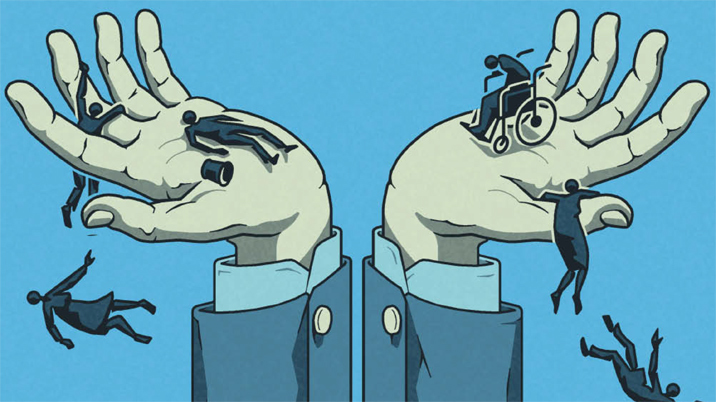
But, what’s the plan
What is the social care crisis? Is it the lack of staff in care homes? Or the difficulty disabled people have in securing the help they need to live a relatively normal life? Or the burden on carers looking after disabled or elderly relatives at home 24/7 for less than the job seekers’ allowance? Or the bureaucracy involved in getting access to services and benefits? Or the lottery of which services are council-funded, depending on where you live? Or the different standards of quality of care?
Or is it simply the cost?
When Boris Johnson entered Downing Street two years ago, he promised to “fix social care once and for all”. But just as with his promise to “get Brexit done”, the “fixing” and the “getting done” meant hundreds of different things to millions of different people.
For the past few days, the national papers have been full of stories about the prime minister’s “manifesto-busting” plans to fulfil that early pledge – more than 100 news pages since Saturday, plus leaders, op-eds and letters.
Yet you can count on one hand the number of stories addressing any of the questions in the first paragraph. (I commend Frances Ryan in the Guardian Journal and the Times leader yesterday). For the rest of Fleet Street, it has been all about the single question in the second – whether it’s the cost to the taxpayer, the cost to the families, or the political / electoral cost of the prime minister breaking his “no tax rises” promise.
Readers know all about the Conservative party angst about raising taxes, that there will be a new “levy” of 1.25% on earned income for everyone, that at some point in the future, people will not have to pay more than a total of £86,000 for care, that people who have to provide the care (predictably) say the £36bn the new tax is expected to raise over the next three years will not be enough. Which, of course, it won’t be – because almost all of it will go to cutting NHS waiting lists.
What was absent from the prime minister’s statement to the Commons on Tuesday was any specific proposal on dealing with the actual problems facing the care sector, and precious little extra cash to keep it going while he works one out. The real money won’t reach its “fix social care” target before the next election – if at all. Who knows who will be in power in 2025? Will the NHS still be needing it to clear the backlog of cases, as advisers have warned ministers? Will the new tax be increased or scrapped by the incoming administration? Does promising money from a future government in which you may play no part, with no plan for how it should be spent, constitute “fixing social care”?
No wonder most papers presented the announcement as “Boris’s gamble”. But they were talking about his electoral gamble, that voters would not punish him for putting up taxes when he said he wouldn’t. Not his gamble that one day someone – very possibly not Johnson himself – might fulfil his promise to make the care system work.
Most papers presented the announcement as “Boris’s gamble”. But they were talking about his electoral gamble.
The prudent and the feckless
For now, for press and PM, the key issue has been people selling their homes to fund their care. It was a worry for millions, Johnson said on Tuesday, that they could be among the one in seven [over-65s] whose care costs topped £100,000. The Daily Mail is – and always has been – on the same page. Yesterday it divided those requiring care into two clear categories: the prudent and the feckless. The prudent had made provision for their old age, yet were penalised for their thrift by having to lose all their savings; the feckless had spent every penny they earned and now expected the state to look after them in their dotage. It seemed to make no allowance for those who struggled to make ends meet, let alone save; people with no hope of being able to buy their own home or profit from record house price rises.
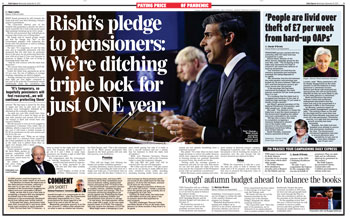
The Daily Express is always on Boris’s side – although it is still chafing at the suspension of the triple lock pension increase – but the rest of the Tory press were as sceptical as the left-wingers about the idea of poor workers having to pay more tax to protect the inheritances of the more affluent, and as concerned as Conservative MPs about the very idea of raising taxes at all. It’s quite the juggling trick – especially when you want to attack Keir Starmer for not coming up with an alternative.
As the week has gone by, however, some are coming round. On Monday, the Mail ran a leader saying a “spurious stealth tax” wouldn’t solve the care crisis; by yesterday it was on board, with a typical “it’s all about me” splash that opened: “Boris Johnson unveiled historic plans to reform social care last night as he hailed the Daily Mail for pushing the crisis to the top of the agenda.” An interesting intro, given that he didn’t unveil any reform plans – a fact reinforced by the main headline: “Now make the care worth the cost, Boris”.
Quite. That’s what matters.
It’s quite the juggling trick – especially when you want to attack Keir Starmer for not coming up with an alternative.
Some numbers, please

One feature of the coverage was the almost universal use of case studies – and the almost universal use of families who had had to sell up to fund a relative’s care.
These panels are a welcome human leavener for the policy and politics, but I wish there had been more diverse background coverage, not least some bald statistics.
I don’t know if it’s that journalists are innumerate (The Times talked about a 1% or 2% rise in NI contributions when it meant percentage points – as Pippa Crerer in the Mirror rightly pointed out, the new rate is nearer a 10% increase), but there seems to be a reluctance to burden the reader with numbers.
This leaves them the poorer. For example, state help with care costs is just that, as too few papers made crystal clear. It is to cover the cost of care. Not of accommodation, or food, or electricity. So it would have been useful to know how much of a residential care home bill counts as “care” and how much families would still have to find to pay for board and lodgings. It may well be that those houses might still have to be sold.
And how much of a problem is that? How many people are having to sell their homes to pay for care? How many are cases of people losing their inheritances – like the man on the telly whose father was dead and whose mother would be “distraught” to know her home had been sold, even though she was never going to live there again? How many are people losing their own homes because they still live in the property that is having to be sold? How many of these are old people having to move after a lifetime because their husband or wife needs residential care and how many adult children who may have spent years looking after a parent and now find themselves homeless? It would be good to know the scale of this problem. Are we talking about hundreds, thousands, a million?
And where does the money go? Who are the care home providers? How much profit do they make? Would they simply put up fees if they knew there was more money washing around? How are they regulated? What is the balance between small private homes and big groups? In the 80s, nursing homes were a cash cow, then there were scandals, a big reversal and financial collapses. Let’s have the history and a clear picture of the state of play. How many staff do they have / need? What are the rates of pay? The hours?
And should we focus so much on the elderly anyway? We are conditioned to think about care homes when we talk about social care, but how much of the total care budget goes on the old? What about the handicapped and disabled? How many people need help, how is it provided at the moment, by whom and at what cost? How many go without the assistance they should have?
It really isn’t all about tax and inheritances.
I don’t know if it’s that journalists are innumerate … but there seems to be a reluctance to burden the reader with numbers.
Spreading the word
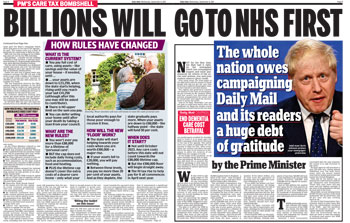
The big hitters were out in force for the “hearts and minds” exercise that followed Johnson’s Commons statement. The Mail bagged the PM with a whole page of “hailing” the paper for its campaign for which the nation should be grateful; The Times got Sunak, the Telegraph Javid, while the Sun had to make do with Gove. That meant there was no one left for the Express, which had to turn to readers for their opinions on the great tax revolution.
Meanwhile, how strange that no one seems to have noticed that the £36bn being promised from this new tax over the next three years wouldn’t quite cover the budget for that Dido Harding Serco test-and-trace contract.
Young vs old
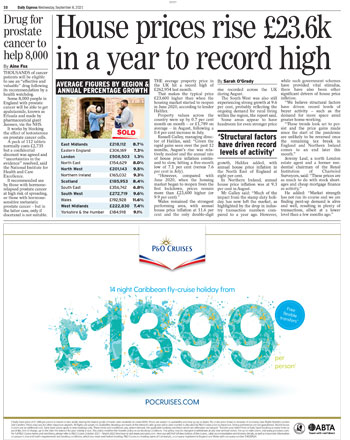
So much of the debate this week has been about the struggling young having to bear the burden for the comfortable old, whether it’s in terms of Covid sacrifices or funding social care. As we’ve seen, the Express is much exercised by pensioners being denied the triple-lock windfall of an 8% rise when everyone else is making do with 2 or 3% at best. And just to hammer home that iniquity at a time when even the first rung of the housing ladder is too far out of reach for so many, the first page lead after its mini-budget coverage yesterday was headlined “House prices rise £23k in a year to record high”.
Farm crisis – whose fault?
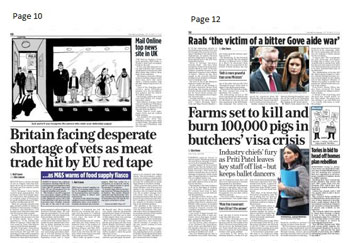
The Mail on Sunday “suffered” a similarly unfortunate run last weekend, when it followed its page 10 lead “Britain facing desperate shortage of vets as meat trade hit by EU red tape” with “Farms set to kill and burn 100,000 pigs in butchers’ visa crisis” on page 12.
I think the two may be related. But you can be sure (a) that it’s nothing to do with Brexit and (b) that it’s all Europe’s fault.
Tugging at the heart strings
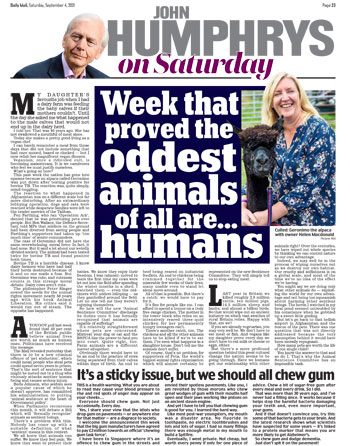
“Last year in Britain, we killed roughly 2.6 million cattle, ten million pigs, 14.5 million sheep and lambs, and almost a billion birds.” So wrote John Humphrys in the Mail on Saturday. As a farmer, he was wondering at the sentimentality shown over Pen Farthing’s Afghan menagerie and the doomed alpaca Geronimo.
Of course, Geronimo was that journalistic favourite, the “ace in the hole”, a solitary cause celebre that people could care about in a way they don’t about the anonymous and numerous animals they eat.
When you or I have a pet that must die, it is usually “put down”, “put to sleep” or, the vet’s preferred term, "euthanised”. Dangerous dogs and horses that fall in a steeplechase are generally “destroyed”. Animals that are too populous for their environment tend to be “culled”; farm animals killed for food or because they are diseased are “slaughtered”. There are plenty of words that could have been used to describe the demise of Geronimo. You can just about understand its distraught owner’s choice of “murdered” – but executed? The Sun seems to have lost its sense of proportion.
Others used a different vocabulary, but the thrust of the coverage was “those nasty men from the ministry killing a probably-innocent creature”.
In case you missed the saga, Geronimo had twice tested positive for bovine TB. Its owner insisted the tests were flawed and wanted a third. The courts and the minister said ‘no’. Much emotion and hot air later, the alpaca was led away to die.
Whether it was a health threat or not may be a moot point. But, as with the social care coverage, there were some statistics that bore publication that appeared nowhere. Last year 38,614 cattle were slaughtered in England and Wales because they had bovine TB (the next quarterly figures will be published next week). Scotland is officially free of the disease. The authorities would like that also to be the case in the rest of the mainland. That is why they insisted Geronimo had to die.
As with the social care coverage, there were some statistics that bore publication that appeared nowhere.
Piers vs Meghan – a near run thing
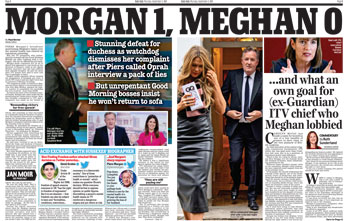
As we’ve seen with the social care and Geronimo coverage, it it’s a fact of print journalism that you can never tell the whole story, paint the complete picture. Sometimes that’s not for the want of trying, it’s just a question of space. At other times, the need for brevity is a blessing, an opportunity to ignore inconvenient truths.
So it was with the Ofcom ruling on Piers Morgan’s famous walkout edition of Good Morning Britain. A record 57,000 complaints were filed about the programme in which he attacked the Duchess of Sussex and said that he didn’t believe a word of what she had told Oprah Winfrey during their interview in March. The complaints were rejected and this was widely reported as a victory for Morgan and free speech over Meghan (never mind the other 56,999 complainants).
The Sun was so delighted that it splashed on the ruling - “Queen of woke can’t silence us any more” – and gave the great man a spread to celebrate his win. The Mail also gave it an early spread “Morgan 1, Meghan 0” (including a sidebar swipe at the Guardian) and a top-half front-page teaser for Jan Moir’s commentary “Imagine the screams in Montecito as Princess Pinocchio finally has her nose tweaked!”
But this ruling all came down to something spectacularly lacking in the tabloid response: balance. Ofcom didn’t uphold Morgan’s right to be as horrid as he liked. In fact, it said that his comments about suicide, mental health and race had the potential to be harmful and highly offensive. He was allowed to make them without censure only because his co-hosts pulled him up, providing protection and context for viewers. That counter-view meant the broadcasting code was not breached.
Asked to expound on the ruling, Ofcom said that the decision had been finely balanced. It had been particularly concerned about Morgan's “apparent disregard for the seriousness of anyone expressing suicidal thoughts” and would have been “seriously concerned” if he had not been challenged by Susanna Reid and Chris Ship.
But when you’re pitching the right to anti-woke free speech against the Duchess of Sussex, the tabs are only ever going to be rooting for one side.
This ruling all came down to something spectacularly lacking in the tabloid response: balance.
Ben Stokes vs The Sun

Sometimes, you can’t help but feel sorry for those papers negotiating the “woke” minefield: we’ve had enough immigrants, but we’re not racist; snowflakes should grow a stiff upper lip, but we “get” mental health issues.
And so they tried, with varying degrees of success and failure, to show understanding and sympathy for Emma Raducanu at Wimbledon, Simone Biles at the Olympics and Ben Stokes, who has stepped back from cricket to “prioritise his mental wellbeing”.
But tabloid journalism is a clod-hopping business; its stock in trade is trampling on feelings, as it did two years ago with a splash on deaths in Stokes’s family years before he was born. Stokes was then the Ashes hero, and dredging up uncomfortable ancient history is a time-worn practice when reporting on those succeeding today. Look back at the coverage of Bradley Wiggins’s family when he first won the Tour de France.
“Low and despicable behaviour”
Mostly, the victims take it on the chin. But – like Harry and Meghan – Stokes chose not to. He denounced the Sun for publishing “extremely painful, sensitive and personal details” about the private lives of his family, going back more than 31 years. It was “low and despicable behaviour disguised as journalism”, “immoral, heartless, contemptuous”, and “utterly disgusting”. Don’t hold back, Ben, tell us what you really think.
The Mirror and Star initially published the story online, but almost immediately withdrew it. But the Sun held firm, saying the story was in the public domain and that Stokes hadn’t asked it not to publish (because it would, of course, have desisted had he done so).

Stokes and his mother, Deborah, sued for breach of privacy and now – rather than take the case to trial – the paper has apologised and paid them damages, saying, “We should not have published the article”. It reported this, not as a splash as per the Ofcom ruling in favour of Morgan and GMB, but as 80 words in its Corrections and Clarifications panel on page 2.
Mrs Stokes, however, appeared in no mood to forgive or forget. She said: "The decision to publish this article was a decision to expose, and to profit from exposing, intensely private and painful matters within our family…Ben and I can take no pleasure in concluding this settlement with the Sun. We can only hope that our actions in holding the paper to account will leave a lasting mark, and one that will contribute to prevent other families from having to suffer the same pain as was inflicted on our family by this article.”
The Guardian gave the story 500 words, the i a small top. The Liverpool Echo, where “the S*n” is a dirty word, and Stokes’s regional paper the Yorkshire Post – whose editor denounced the Sun story at the time – also reported the apology. No other national title touched the story. Which is odd, given the oft-cited concerns about “back-door privacy laws”. Here was an example of a newspaper accepting that there are boundaries – even with material in the public domain – rather than stand and fight in court. It was an important decision for our trade.
No other national title touched the story. Which is odd, given the oft-cited concerns about “back-door privacy laws”.
A biased report on bias?
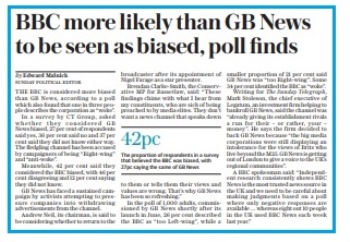
Bashing the BBC is a team sport for many of our newspapers, to such an extent that my eyes float over most of the negative headlines (there will doubtless be much “advice” mixed with the mudslinging now that Fran Unsworth is stepping down as head of news). But one from the Sunday Telegraph, on page 3, stopped me in my tracks: “BBC more likely than GB News to be seen as biased, poll finds”.
Really? That’s very interesting.
Who conducted the poll? Mori? YouGov? No, an organisation called CT Group. Who commissioned the poll? GB News. Ah, right.
And what did it find? When asked if the different channels were biased, 27% of respondents said “Yes” to GB News, against 42% who said “Yes” to the BBC. So that stands up the headline. Meanwhile, 46% said the BBC was not biased, against 36% for GB News. So you could have had a headline that was the complete opposite of the one printed.
The key factor here, though, was the “don’t knows”. Only 12% of those questioned had no opinion on the BBC, against 37% for GB News. Which is hardly surprising. GB News has an audience measured in the tens of thousands (on a good day) against the millions who watch the BBC. The chances of the polsters finding 1,000 people who had even seen the channel were pretty remote.
The Telegraph didn’t enlighten readers on who or what CT Group is. A quick google shows that it is an Australian lobbying firm and political consultancy, formerly known as Crosby Textor. The Crosby in question is Lynton Crosby, who also happened to be Boris Johnson’s election strategist and master of the “dead cat”.
Bias? Maybe a survey conducted by a right-wing organisation for a right-wing news channel and reported in a right-wing newspaper is completely unpartisan. But it does feel like an example of preaching to the choir.
Front page of the fortnight

This, from the Sun on the day the last US soldiers left Afghanistan, told the story better than any of the emotional pictures elsewhere. It put me in mind of that photograph of American troops in Saddam’s palace in 2003.
Talk about turning the tables.
Liz Gerard’s Notebook is a fortnightly column published in the InPubWeekly newsletter. To be added to the mailing list, enter your email address here.












